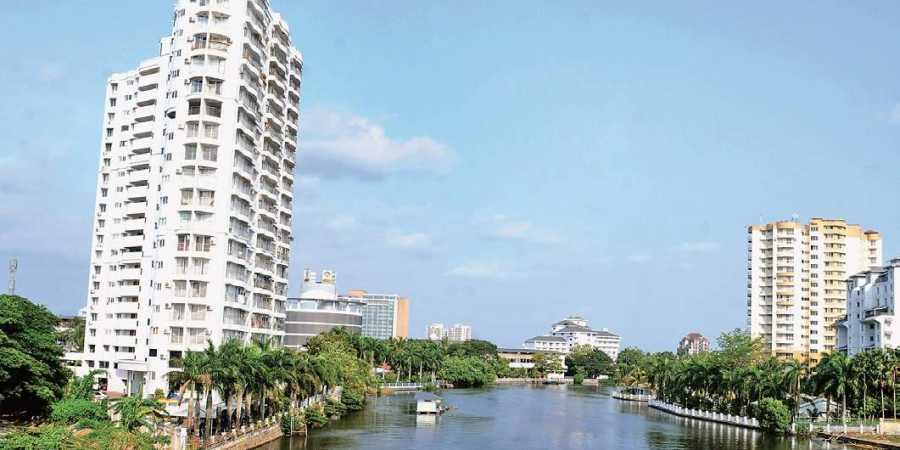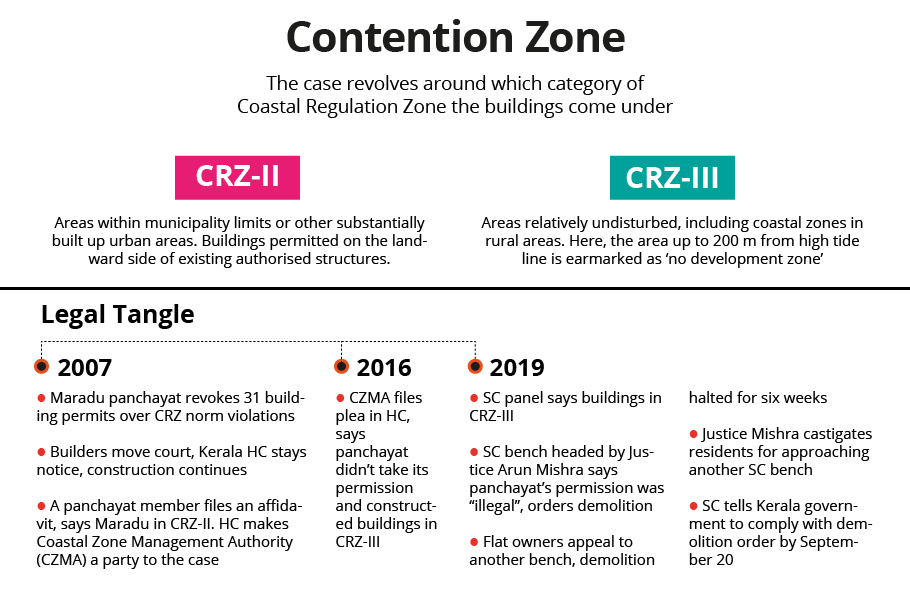
Maradu residents live in fear as sword of demolition drive hangs
The past few days have been traumatic for Krishna Latha, a resident of the multi-storied Holy Faith apartment complex situated along the banks of Vembanadu Lake in Maradu of Kerala’s Ernakulam district.

The past few days have been traumatic for Krishna Latha, a resident of the multi-storied Holy Faith apartment complex situated along the banks of Vembanadu Lake in Maradu of Kerala’s Ernakulam district. Krishna and her husband who had put in all their life’s savings to buy a flat in the apartment complex after their return from China, have been left rattled by the Supreme Court’s recent order to demolish her apartment complex along with three others along the lake for flouting Coastal Regulation Zone (CRZ) norms.
“I was shocked and feel completely helpless. The money we had saved after living in Hong Kong was invested in this flat. I cannot leave this place at any cost,” she says.
Lifetime savings go down the drain
Not only Latha, the Supreme Court’s May 18 order to the local body to demolish four multi-storied buildings – Jains Coral Cove, Golden Kayaloram, H2O Holy Faith and Alfa Serene – along the banks of Vembanadu Lake for violating CRZ norms by September 20, is giving sleepless nights to almost 344 families residing in these complexes.
Also read: Maradu flat demolition order in Kerala leaves residents in the lurch
Like Latha, many residents in these apartments have invested their lifetime earnings to purchase a flat, while many others have availed loans for the same, which are yet to be repaid.
Krishnan, another resident, says he had availed a loan of ₹40 lakh from a nationalised bank and had mortgaged his ancestral land in Kochi, to buy a flat in the apartment complex, but now has no other option than to return to his village. “I haven’t even repaid the loan. It’s been nearly 10 years since we purchased the house and I have to pay the loan for another 10 years,” he says adding that it wouldn’t be financially feasible for him to live in a rented house in the city.
The residents of these apartments, who had bought the flats between 2010 and 2015, say they were completely unaware about the violations under the CRZ as the Kerala High Court had ruled in their favour twice when the Local Self Government Department (LSGD) had slapped show cause notices on the builders in 2006.
What triggers the demolition order?
The Maradu panchayat, which falls under the joint jurisdiction of Kochi City Municipal Corporation and Thrippunnithara Municipality was the most sought-after place in 2006 due to its pristine environment and rustic charm. “Many people started buying land in the panchayat enamoured by its rustic appeal and its proximity to the Vembanadu Lake,” says N Kurian, an elderly man in the locality. The ambience and availability of vacant land also urged many builders to apply for permission to construct apartment buildings close to the Vembanadu Lake. Subsequently, the panchayat secretary started giving approval to builders after seeking an opinion from the then chief town planning officer.
“Though the Environmental Protection Act was framed in 1986, there was no proper roadmap about environmentally sensitive zones covered under CRZ. So, the panchayat had approved the plans of 13 builders after seeking the help of then town planning officials,” says Kurian, who has been a resident for four decades.
But, the same year, the panchayat secretary was pulled up by the Local Self Government Department (LSGD), an authority that oversees the functioning of local bodies in Kerala, for granting the permission to build houses in the sensitive area. The department had asked its vigilance committee to probe all the irregularities in the village during which the 13 apartments that got the permission also came to light. Subsequently, based on the instruction of the LSGD, the local body officials issued a show cause notice to the builders to stop work while asking them for an explanation.
The legal battle
While nine of the 13 builders stopped the construction work, four – Jain Housing and Construction Ltd, KP Varkey & VS Builders, H2O Holy Faith and Alfa Serene – approached the Kerala High Court challenging the validity of the show cause notice issued to them.
As the show cause notice issued to the builders were not in accordance with section 16 of the Kerala Panchayat Building Rules, the High Court asked the local body to issue a fresh show cause notice that adhered to the building rules. No compliance by the local body with the high court order encouraged the builders to go ahead with the construction of the buildings. The builders in 2010, approached the now upgraded Maradu Municipality to issue occupancy certificate to the owners of the four apartments. But, the municipality rejected the plea, following which the builders moved the Kerala High Court again to obtain an occupancy certificate. Holding the local body officials accountable for not sending the fresh notices, the high court ordered the municipality to issue the occupancy certificate. Later, when the Kerala Coastal Zone Management Authority (KCZMA) went on for an appeal, the divisional bench of the High Court upheld the two-member bench’s order and directed the local body officials to issue the certificate.
Sources said, during the hearing, the Justices of the High Court allegedly made several observations against KCZMA and called them “corrupt”. According to advocate Shamsudheen Karunagapally, the chairman of Maradu Bhavana Samrakshana Samithi (Maradu House Protection Council), these observations forced the authority to move Supreme Court.
“After hearing the case, the Supreme Court formed a three member committee to study the place and submit a report. Though the apex court asked the committee to get the victim’s point of view as well, the committee ignored residents and treated builders as the ‘victims’ in its report,” says Shamsudheen.
“We were unaware of the violations until a couple of years ago when committee members came here to conduct a survey,” says Hanifa, a resident of Holy faith apartment. “How are we supposed to take up the responsibility for the mistake that has been done by the local body officials and the builders?” she asks.

Political power play
Residents say the issue is now being politicised by local leaders to gain mileage. “When the issue was in court, no one cared for us, and now all the parties are showing interest in the issue, showing compassion. It is now being politicised as the approval for the plots were given by the Left Democratic Front (LDF),” says RS Saji Mon, a resident of a hamlet in Kochi fort.
Even though the Congress was the first party to support the residents after the Supreme Court’s order, residents say the CPI and CPI (M)-led state government had asked them to vacate the residence complexes before 5pm of September 5.
But the state government recent interest in supporting the locals has come as a sign of hope for many. “The state government showed interest to help the residents only after BJP cadres backed residents who staged a protest by erecting flags outside the gate of the apartment complex,” said a local CPI (M) cadre on conditions of anonymity.
The Kerala government has now decided to send a three-member committee to New Delhi to decide on the further course of legal action to help the residents.
Also read: Kerala all-party meet decides on legal recourse to halt Maradu flats demolition
Locals say, although the state government in its bid to keep the saffron party at bay, is now trying to help residents, CPI and CPI (M) veterans have been vehemently demanding the immediate demolition of the constructions as per the Supreme Court directive. While senior CPI (M) leader and former Chief Minister VS Achuthanandan urged to backlist the builders who constructed the huge complexes, CPI state secretary Kanam Rajendran has asked the government to implement the Supreme Court order at the earliest.
With the state government slated to update the Supreme Court on the demolition drive in the next hearing on September 23, anxious residents expect the state government to request the court to reconsider the demolition.
“We have not even thought of moving out of this place. What if the Supreme Court rejects our grievance?” asks Susan, a resident in one of the apartments.
Fear of collateral damage?
Locals say the Supreme Court directive would also affect those living outside these four complexes.
“We have constructed our houses years before these apartment came up. Whatever technology they use to demolish these buildings, it would definitely have an impact on our houses. Given the recent rains, our houses would even crumble under the impact of demolishing those buildings,” says S Sathya.
When contacted chief municipal officer Subhash PK, said that they are looking at all legal possibilities to stall the demolition.
What is a CRZ?
Under the Environment Protection Act, 1986, places near water bodies were marked as Coastal Regulation Zones (CRZ). There are four types of zones namely CRZ I, II, III, IV and each has different norms to be followed for constructing buildings.
CRZ I are ecologically sensitive zones and constructions are completely banned in such places. CRZ II areas are city municipal corporations and municipal corporations where development activities are already underway and new constructions are allowed on the existing place near the water bodies. CRZ III are completely not exposed to any kind of development and are mostly villages. In such places, constructions are allowed only within 200 metres from the shore. However, there is no CRZ IV area in Kerala, which is applicable only to the islands.
According to sources, when the builders started constructing the apartments, the Maradu area was under the CRZ III category which allows construction only after 200 metres from the water body, apart from several other restrictions.
But, sources say during the legal battle, the state government proposed to convert the Maradu area to CRZ II category. The Centre approved the same on February 28 this year which was accepted by the state government on March 5, 2019.
So by the new rules, now if a new apartment is constructed in the same place, after the demolition of the five buildings of the four apartments, it is legally valid and it does not violate the CRZ rules.

